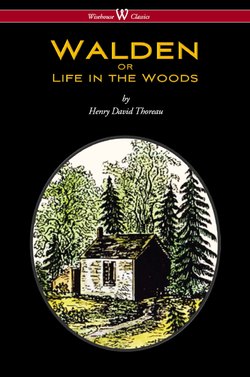WALDEN or Life in the Woods (Wisehouse Classics Edition)

Реклама. ООО «ЛитРес», ИНН: 7719571260.
Оглавление
Henry David Thoreau. WALDEN or Life in the Woods (Wisehouse Classics Edition)
Отрывок из книги
Walden
or
.....
Old Johnson, in his “Wonder–Working Providence,” speaking of the first settlers of this town, with whom he was contemporary, tells us that “they burrow themselves in the earth for their first shelter under some hillside, and, casting the soil aloft upon timber, they make a smoky fire against the earth, at the highest side.” They did not “provide them houses,” says he, “till the earth, by the Lord’s blessing, brought forth bread to feed them,” and the first year’s crop was so light that “they were forced to cut their bread very thin for a long season.” The secretary of the Province of New Netherland, writing in Dutch, in 1650, for the information of those who wished to take up land there, states more particularly that “those in New Netherland, and especially in New England, who have no means to build farmhouses at first according to their wishes, dig a square pit in the ground, cellar fashion, six or seven feet deep, as long and as broad as they think proper, case the earth inside with wood all round the wall, and line the wood with the bark of trees or something else to prevent the caving in of the earth; floor this cellar with plank, and wainscot it overhead for a ceiling, raise a roof of spars clear up, and cover the spars with bark or green sods, so that they can live dry and warm in these houses with their entire families for two, three, and four years, it being understood that partitions are run through those cellars which are adapted to the size of the family. The wealthy and principal men in New England, in the beginning of the colonies, commenced their first dwelling-houses in this fashion for two reasons: firstly, in order not to waste time in building, and not to want food the next season; secondly, in order not to discourage poor laboring people whom they brought over in numbers from Fatherland. In the course of three or four years, when the country became adapted to agriculture, they built themselves handsome houses, spending on them several thousands.”
In this course which our ancestors took there was a show of prudence at least, as if their principle were to satisfy the more pressing wants first. But are the more pressing wants satisfied now? When I think of acquiring for myself one of our luxurious dwellings, I am deterred, for, so to speak, the country is not yet adapted to human culture, and we are still forced to cut our spiritual bread far thinner than our forefathers did their wheaten. Not that all architectural ornament is to be neglected even in the rudest periods; but let our houses first be lined with beauty, where they come in contact with our lives, like the tenement of the shellfish, and not overlaid with it. But, alas! I have been inside one or two of them, and know what they are lined with.
.....